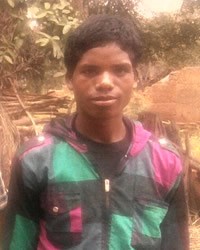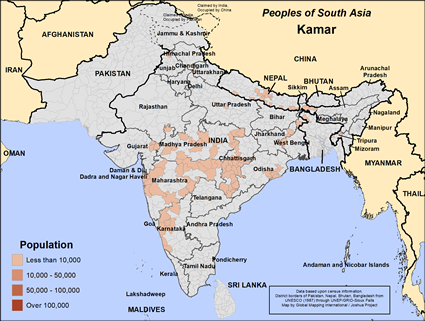Kamar in Nepal

Photo Source:
Anonymous
|

Map Source:
People Group data: Omid. Map geography: UNESCO / GMI. Map Design: Joshua Project.
|
| People Name: | Kamar |
| Country: | Nepal |
| 10/40 Window: | Yes |
| Population: | 1,700 |
| World Population: | 30,700 |
| Primary Language: | Nepali |
| Primary Religion: | Hinduism |
| Christian Adherents: | 0.00 % |
| Evangelicals: | 0.00 % |
| Scripture: | Complete Bible |
| Ministry Resources: | Yes |
| Jesus Film: | Yes |
| Audio Recordings: | Yes |
| People Cluster: | South Asia Tribal - other |
| Affinity Bloc: | South Asian Peoples |
| Progress Level: |
|
Introduction / History
The Kamar consider military service their traditional occupation and say that they converted to farming and manual labor jobs through force of circumstances. Sadly, their lives are aimed entirely at physical survival and the fight against natural disaster and starvation. There are a very small number of Kamar people in Bangladesh. There are more in Nepal, but most are in central India where they originated.
What Are Their Lives Like?
Most Kamar people earn their income by making bamboo items, which they sell and trade in the weekly markets. Many engage in basketry throughout the entire year, and they are well known for this skill. Their fine bamboo baskets can be traded for goods such as rice, tea and liquor. Farming is the secondary occupation of the Kamar, followed closely by hunting and fishing. They may supplement their incomes by collecting forest products, especially certain types of leaves, which are sold to contractors. The women do much of the strenuous work in the fields and forests. Many of the smaller Kamar villages consist of settled farmers, but all Kamar believe that it was their destiny to practice the slash and burn method of agriculture. Even those who work on permanent plots burn off the land and practice crop rotation. The fields are worked with pickaxes and spades, and iron sickles are used to harvest the crops. The Kamar are dispersed in villages which are generally mixed with other tribal communities. The settlements consist of scattered huts with no definite pattern. The larger villages are located near the foothills or deep in the forests, while the smaller settlements are found along roadsides. Kamar typically live in two-room mud huts. One of the rooms is for storage and for the household god. Their houses are very neat and clean. Every home has various kinds of fishing traps since all Kamar love to fish. Many have a shed for socializing, as well as a separate cattle shed. Most houses also have a bari, or small vegetable garden, which is an important factor in their survival. The Kamar tribe is divided into a number of clans. These are endogamous, meaning they only marry within their own clan. They prefer cross cousin marriages, and males initiate the marriage negotiations. Kamar people wear very simple clothes. They do not wear shoes, and they tie cotton cloths, or phundras around their heads. There are noticeable differences between the traditional and modern styles. For example, Kamar girls wear saris (wrap-around dresses) made from elaborate prints whereas, the traditional clothes were plain white. They also wear petticoats, glass bracelets, and elaborate hair pins.
What Are Their Beliefs?
Kamar people practice Hinduism, the ancient religion of India. Hinduism is a catch-all phrase for the local religions of South Asia, so it is very diverse. At the popular level, Hindus worship and serve the gods of the Hindu pantheon. They visit Hindu temples and offer prayers, food, flowers, and incense to their gods in hopes of gaining protection and benefits. They do not have a personal or familial relationship with their gods like Christians or Jews.
What Are Their Needs?
Kamar people need more than anything else to know Almighty God who came to earth in the form of a man, who is Jesus Christ, and paid the price for their eternal life to set them free from the penalty of sin. Although the Bible, audio, and visual resources exist in their Nepali language, they remain an unreached people group. They need someone to tell them.
Prayer Points
Pray that entire Kamar villages will hear and understand the good news and begin their own Disciple Making Movement. Pray for a desire for holiness and humility to embrace Lord Jesus in obedience. Pray for Holy Spirit-anointed workers to go to them.